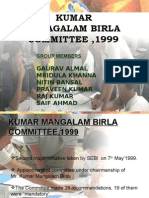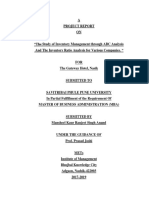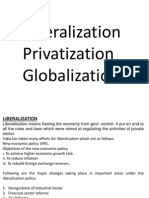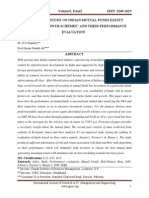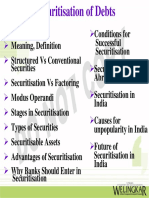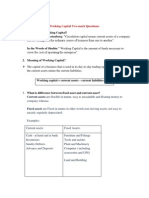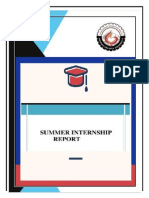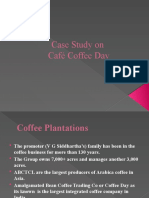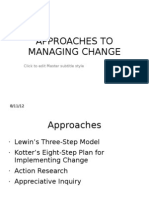MCS Project
MCS Project
Uploaded by
Naveen KumarCopyright:
Available Formats
MCS Project
MCS Project
Uploaded by
Naveen KumarOriginal Description:
Original Title
Copyright
Available Formats
Share this document
Did you find this document useful?
Is this content inappropriate?
Copyright:
Available Formats
MCS Project
MCS Project
Uploaded by
Naveen KumarCopyright:
Available Formats
Management Control Systems at Reliance Industries Limited
Management Control Systems at Reliance Industries Limited
Submitted by Jayant Kumar Agarawal Kapil Gupte Pranav Bhide Rohit Marwal Nikunj Doshi
IBS HYDERABAD BATCH OF 2011
IBS Hyderabad
Page 1 of 15
Management Control Systems at Reliance Industries Limited
Company Profile
Reliance Industries Limited (RIL) is worlds leading and Indias no: 1 Private Ltd. Company. RIL group is a highly diversified group and is in to multiproduct business like oil / gas exploration, retail of petro / consumer products and mfg. of petrochemical / refining and textile products. Also, in to infrastructure and transportation sectors. he Reliance Group, founded by Dhirubhai H. Ambani (1932-2002), is India's largest private sector enterprise, with businesses in the energy and materials value chain. Group's annual revenues are in excess of US$ 44 billion. The flagship company, Reliance Industries Limited, is a Fortune Global 500 company and is the largest private sector company in India. Backward vertical integration has been the cornerstone of the evolution and growth of Reliance. Starting with textiles in the late seventies, Reliance pursued a strategy of backward vertical integration - in polyester, fibre intermediates, plastics, petrochemicals, petroleum refining and oil and gas exploration and production - to be fully integrated along the materials and energy value chain.The Group's activities span exploration and production of oil and gas, petroleum refining and marketing, petrochemicals (polyester, fibre intermediates, plastics and chemicals), textiles, retail and special economic zones. Reliance enjoys global leadership in its businesses, being the largest polyester yarn and fibre producer in the world and among the top five to ten producers in the world in major petrochemical products. Major Group Companies are Reliance Industries Limited (including main subsidiary Reliance Retail Limited) and Reliance Industrial Infrastructure Limited
IBS Hyderabad
Page 2 of 15
Management Control Systems at Reliance Industries Limited
2 Organizational Structure of Reliance
RelianceIndustries Limited
Reliance Petroleum Limited
Reliance Logistics
Reliance Life Sciences
Reliance Retail Limited
Reliance Industrial Infrastructure Limited (RIIL)
Figure 1 Reliance Major Subsidiaries
Reliance Petroleum Limited (RPL) was a subsidiary of Reliance Industries Limited (RIL) and was created to exploit the emerging opportunities, creating value in the refining sector worldwide.Currently, RPL stands amalgamated with RIL.[7]
Reliance Life Sciences is a research-driven, biotechnology-led, life sciences organization that participates in medical, plant and industrial biotechnology opportunities. Specifically, these relate to Biopharmaceuticals, Pharmaceuticals, Clinical Research Services, Regenerative Medicine, Molecular Medicine, Novel Therapeutics, Biofuels, Plant Biotechnology and Industrial Biotechnology.[8]
Reliance Industrial Infrastructure Limited (RIIL) is engaged in the business of setting up / operating Industrial Infrastructure that also involves leasing and providing services connected with computer software and data processing.[9]
Reliance Logistics (P) Limited is a single window solutions provider for transportation, distribution, warehousing, logistics, and supply chain needs, supported by in house state of art telematics and telemetry solutions.[11]
IBS Hyderabad
Page 3 of 15
Management Control Systems at Reliance Industries Limited
Reliance Clinical Research Services (RCRS), a contract research organization (CRO) and wholly owned subsidiary of Reliance Life Sciences, has been set up to provide clinical research services to pharmaceutical, biotechnology and medical device companies.[12]
As far as Board structure of RIL is concerned there are 8 Non executive directors and four executive directors, hence RIL is strictly following suggestions given by Kumar mangalam Birla committee regarding corporate governance.
Figure 2 Reliance Board Structure
Figure 3 Reliance Reporting Hierarchy
IBS Hyderabad
Page 4 of 15
Management Control Systems at Reliance Industries Limited
2.1 Functional structure
Employees within the functional divisions of an organization tend to perform a specialized set of tasks, for instance the engineering department would be staffed only with production engineers. This leads to operational efficiencies within that group. However it could also lead to a lack of communication between the functional groups within an organization, making the organization slow and inflexible. As a whole, a functional organization is best suited as a producer of standardized goods and services at large volume and low cost. Coordination and specialization of tasks are centralized in a functional structure, which makes producing a limited amount of products or services efficient and predictable. Moreover, efficiencies can further be realized as functional organizations integrate their activities vertically so that products are sold and distributed quickly and at low cost. For instance, a small business could start making the components it requires for production of its products instead of procuring it from an external organization. But not only beneficial for organization but also for employees faiths. Hence Reliance is Having Highest Operational efficiency as compared to competitors.
3 Management Style And Culture At Reliance Industries Limited
Reliance Industries Limited (RIL) has emerged as India's largest private-sector enterprise and carved out a distinct place for itself in global Fortune 500 companies. Reliance's business success and competitive position reflect the leadership provided by its founder, Mr. Dhirubhai Ambani who said, "Growth has no limit at Reliance. I keep revising my vision. Only when you dream it do you get it." The leadership system defined by Ambani is based on value creation towards both its customers and stakeholders. The same vision has been taken up and forwarded by his son Mr. Mukesh Ambani, current Chairman and Managing Director of RIL. Reliance believes that any business conduct can be ethical only when it rests on the nine core values of Honesty, Integrity, Respect, Fairness, Purposefulness, Trust, Responsibility, Citizenship and Caring.
IBS Hyderabad
Page 5 of 15
Management Control Systems at Reliance Industries Limited
The existence of the culture in RIL is driven towards achievement of excellence in systems, processes, technology and people and also toward the fulfillment of their corporate vision i.e. "To become a globally competitive enterprise, driven by the market, creating and maintaining a lead over competition through quality products and establishing itself to be the preferred supplier of its customers." With the vertical integration of chain from refinery to textiles, RIL has unique fully integrated structure. Basically it is a process centric organization that maximized synergies across all interfaces, leverage core competencies of various disciplines to maximize value from current assets and create growth opportunities while allowing people to develop and contribute to their full capabilities. When we talk about the organization culture, specifically RIL focuses on high performance work culture which fosters innovation, entrepreneurship, inclusiveness, teamwork and continuous improvements. Among all RIL basically focuses on innovation and has a innovative council for promoting the same. The company believes that it is the innovation in thinking and execution that has made RIL reach where it is today. The firm belief of innovation being the differentiator for future and the source of competitive advantage shows the importance that is given to it. RIL in the early 1990s did suffer from low employee participation in improvement activities and low customer satisfaction. The introduction of various quality improvement tools in the facilities like the Total Quality Management( TQM), Kaizen Activities and customer focus approach led to the improvement in quality, productivity improvement and customer satisfaction in the organization. RIL realizing the importance of human and intellectual capital for business success, has given more importance to the use of its human potential and the creation of Learning organization to help in continued success in future. RIL in its importance to the health and safety also has also initiated Safety, Health and Workplace Environment Program (CASHe) which is an initiative to promote healthy workplace and reducing health and safety risk has been instrumental in creating a culture of implementing health, safety and environment project on a priority basis. This program has also been able to improve the performance of the company on the occupational health and safety front. The Health and Safety Principles that were put forward in this regards to articulate the stakeholders expectation along with the existing values of the company underpin both the corporate culture and cooperation across the company.
IBS Hyderabad Page 6 of 15
Management Control Systems at Reliance Industries Limited
The growing importance of Corporate Governance by RIL shows its priority towards a transparent and accountable organization thus being able to meet the needs of all the concerned stakeholders. The publication of annual corporate governance report is one important aspect showing its growing inclination towards it and its aim to have fair and equitable treatment of its employees, shareholders, customers and investors. They aim to provide timely and balanced disclosure of all material information concerned towards stakeholders. Moreover they aim to have a sound system of risk management and internal control. The existence of code for board of directors and board committees, code of business conduct and ethics for director/management personnel signifies the existence of the culture driving the whole organization towards effective corporate governance. RIL has a long and strong tradition of supporting the larger communities that it connects with from education, health, drinking water, large-scale development of employable skills, to assistance during natural calamities such as earthquakes and cyclones. The Reliance Foundation would address social development imperatives of India, specifically quality, formal and vocational education, affordable high-quality health care, meaningful rural development and urban renewal, and protection and promotion of India's priceless heritage of arts and culture. Management in simple words are characteristic ways of making decisions and relating to subordinates. Different management styles and employed by different organizations depending on the prevailing culture, the nature of the business, the nature of the task and the personality and skills of the leaders. RIL is an organization which is operation in multiple facets. They have multiple manufacturing facilities at multiple locations where by dealing in different product ranges. The supreme authority of the company is Board of Directors. But they have given much more independence to the individual units at different level to take decisions at their level. There is a good mix of corporate level strategy (taking RIL as a whole which is set up by the BOD) as well as appropriate business level and operational strategies at each segment as well as business units to accomplish the corporate level strategy. Every unit which is a part of RIL has its own hierarchy, headed by the CEO or the President, but a more of a democratic style of leadership is seen. Since they promote innovation and value their
IBS Hyderabad Page 7 of 15
Management Control Systems at Reliance Industries Limited
human capital they promote participative environment at different levels of management to be able to make a better and informed decision. Empowering the employees in RIL is relevant. However the level of decisions and intensity of problems are defined whereby decisions can be taken at particular level of management.
4 Management Control Systems
4.1 Internal Controls
RIL has a comprehensive system of internal controls to safeguard the Companys assets against loss from unauthorised use and ensure proper authorisation of financial transactions. The Company has an exhaustive budgetary control system to monitor all expenditures against approved budgets on an ongoing basis. The Companys accounting process is based on uniform accounting guideline that sets out accounting policies and significant processes and deadlines on a company wide basis. There are binding directives for internal reconciliations and other accounting operations. The Company maintains a system of internal controls designed to provide a high degree of assurance regarding the effectiveness and efficiency of operations, the reliability of financial controls, and compliance with laws and regulations. RIL has well established policy towards maintaining the highest standards of health, safety and environmental norms while maintaining operational integrity. This policy is strictly adhered to all RIL manufacturing facilities. The Company has an internal audit function, which is empowered to examine the adequacy and compliance with policies, plans and statutory requirements. It is also responsible for assessing and improving the effectiveness of risk management, control and governance process. The management duly considers and takes appropriate action on the recommendations made by the statutory auditors, internal auditors and the independent Audit Committee of the Board of Directors.
4.2 Internal Checks and Balances.
At the heart of our processes is the wide use of technology that ensures robustness and integrity of financial reporting. Reliance deploys a robust system of internal controls to allow optimal use and protection of assets, facilitate accurate and timely compilation of financial statements and
IBS Hyderabad
Page 8 of 15
Management Control Systems at Reliance Industries Limited
management reports and ensure compliance with statutory laws, regulations and company policies.
4.3 Audit committee
Powers of the Audit Committee: 1. To investigate any activity within its terms of reference. 2. To seek information from any employee. 3. To obtain outside legal or other professional advice. 4. To secure attendance of outsiders with relevant expertise, if it considers necessary The role of the Audit Committee includes: 1. Oversight of the Companys financial reporting process and the disclosure of its financial information to ensure that the financial statements are correct, sufficient and credible. 2. Recommending to the Board, the appointment, reappointment and, if required, the replacement or removal of Statutory Auditors and fixation of audit fees. 3. Approval of payment to Statutory Auditors for any other services rendered by the Statutory Auditors. 4. Reviewing with the management, the annual financial statements before submission to the Board for approval, with particular reference to:
Matters required to be included in the Directors Responsibility Statement to be included in the Directors Report in terms of sub- section (2AA) of Section 217 of the Companies Act, 1956.
Changes, if any, in accounting policies and practices and reasons for the same.
IBS Hyderabad
Page 9 of 15
Management Control Systems at Reliance Industries Limited
Major accounting entries involving estimates based on the exercise of judgement by the management.
Significant adjustments made in the financial statements arising out of audit findings.
Compliance with listing and other legal requirements relating to financial statements.
Disclosure of related party transactions. Qualifications in draft audit report.
5. Reviewing with the management, the quarterly financial statements before submission to the Board for approval. 6. Reviewing with the management, the performance of Statutory and Internal Auditors, adequacy of internal control systems. 7. Reviewing the adequacy of internal audit function, if any, including the structure of the internal audit department, staffing and seniority of the official heading the department, reporting structure, coverage and frequency of internal audit. 8. Discussion with Internal Auditors any significant findings and follow up thereon. 9. Reviewing the findings of any internal investigations by the Internal Auditors into matters where there is suspected fraud or irregularity or a failure of internal control systems of a material nature and reporting the matter to the Board. 10. Discussion with Statutory Auditors before the audit commences, about the nature and scope of audit as well as post audit discussion to ascertain any area of concern. 11. To look into the reasons for substantial defaults, if any, in the payment to the depositors, debentureholders, shareholders (in case of nonpayment of declared dividends) and creditors.
IBS Hyderabad
Page 10 of 15
Management Control Systems at Reliance Industries Limited
12. To review the functioning of the Whistle Blower Mechanism. 13. Carrying out such other functions as may be specifically referred to the Committee by the Board of Directors and / or other Committees of Directors of the Company. 14. To review the following information :
The management discussion and analysis of financial condition and results of operations;
Statement of significant related party transactions (as defined by the Audit Committee), submitted by management;
Management letters / letters of internal control weaknesses issued by the Statutory Auditors;
Internal audit reports relating to internal control weaknesses; and The appointment, removal and terms of remuneration of Internal Auditors.
15. Reviewing the financial statements and in particular the investments made by the unlisted subsidiaries of Company. 16. Review of uses / application of funds raised through an issue (public issue, rights issue, preferential issue, etc.) Recommendation In our opinion and according to the information and explanations given to us, there is an adequate internal control system commensurate with the size of the Company and the nature of its business for the purchases of inventory and fixed assets and for the sale of goods and services. During the course of our audit, we have not observed any continuing failure to correct major weaknesses in internal control system.
IBS Hyderabad
Page 11 of 15
Management Control Systems at Reliance Industries Limited
5 Rewards and Recognition
Many types of rewards and recognition have been given by Reliance to its employees, such as cash bonuses and stock awards, and a wide variety of company-paid perks, like car allowances, paid parking, and gift certificates. Other types of rewards and recognition may be less tangible, but still very effective. These "non-monetary" rewards include formal and informal acknowledgement, assignment of more enjoyable job duties, opportunities for training, and an increased role in decision-making. Reliance believes Growth is Life for Reliance and for all Reliance people. A large in-house pool of intellectual capital is the driving force behind Reliances accelerated growth, and is one of its fundamental competitive strengths. To enable consistent growth, Reliance puts a great deal of effort behind creating a workplace where every Reliance employee can reach their full potential and achieve maximum personal fulfillment. RIL's talent base, as on March 31, 2010, stands at 23,365 with the average employee age of 41 years. The aim is to lower the average employee age and invigorate the youth to take the organization forward over the next few decades as indeed the current leaders have done over the last 30 years by starting early in their 20s and 30s. The entrepreneurial spirit has been a hallmark of the organization. The Company continues to nurture this as it grows exponentially Breakup of professional workforce Ph.D- 2% MBAs- 9% Engineers- 83% CA/ ICWAs- 6%
Age Profile Upto 25 years- 5% 26 - 35 years -44% 36 - 45 years -34% 46 - 55 years -15% 56 + years -2%
Page 12 of 15
IBS Hyderabad
Management Control Systems at Reliance Industries Limited
Reliance offers world of opportunities to employees by giving them more freedom and responsibility to chart their own course within the company. The company offers comprehensive world-class training and development resources. Networking, coaching and mentoring provide additional opportunities for people to grow personally and professionally throughout their careers. Reliances appraisal and reward system is aimed at increasing employee involvement in the goals and objectives of the organization, and encouraging individuals to go beyond their scope of work, undertake voluntary projects that enable them to learn, and contribute innovative ideas in meeting the targets of the company. The company has moved to a Key Result Area oriented performance appraisal system and will soon move to performance linked incentive scheme, wherein the employees will share the risk and the rewards of companys performance, business performance, team performance and their individual performance. As an ongoing exercise, RIL has continued to look at, identify, create and execute seamlessly, initiatives which enhance productivity and efficiency. Towards this end, the Company has put into place a central shared services organization for HR, wherein Global Best Practices for HR Shared Services are integrated. The objective of this centre, apart from leveraging on the economies of scale, is to provide a world class experience to the employees on all the matters that they have to deal with on a day-to-day basis including all transactions. RIL continues to invest in people through various Learning & Development initiatives, which has seen 3,092,403 man hours of Learning & Development activities at manufacturing divisions. E-learning as a medium is much sought after by the employees for upgrading skills and competencies since people can learn when needed at their own convenience and from where they may be. The Company has continued to invest in this area through newer and state-of-the-art modules both in the Technical and Management domains.
IBS Hyderabad
Page 13 of 15
Management Control Systems at Reliance Industries Limited
6 Communication and coordination
Coordination and communication is central to the very existence of organizations. Specific management communication within the organization is necessary for coordination Reliance focuses on building life-long relationships with its stakeholders and believes it is important to understand their concerns and perception. For this it has initiated a sharper and more focused dialogue with key stakeholders, which involved shareholders, customers, suppliers, employees, regulatory authorities, local community, trade unions, NGOs and contractors. Acting upon the feedback, it has restructured the processes to address their concerns better and design programmes that would enhance their quality of life. The Board of Directors determines strategic business imperatives and mentors the achievement of reliance corporate goals. It executes its role in corporate governance through regular reviews of Reliances financial performance and critical business issues. The quarterly and yearly financial results are sent to the Stock Exchanges immediately after the Board approves the same. These results are also published in various magazines, newspapers etc In order to provide better communication and coordination Reliance organizes different meetings for the following: Shareholders
Annual General Meetings (AGMs) Shareholders grievance meetings One-to-one meeting Open forum
Customers
Market Research External Customer Satisfaction Survey
IBS Hyderabad Page 14 of 15
Management Control Systems at Reliance Industries Limited
Employees
Feedback mechanism- 'Employees Suggestion Scheme' Awards for 'best Case studies' for Internal Learning- 'QUEST', 'Peer Group Sharing' HSE Committees 'Toolbox Talks' Self Development Modules ILNA (Individual Learning Needs Assessment) Career progression / job rotation / role diversification Business Dialogue- 'shop floor communication meet' In-house newsletters
Suppliers
Separate Contractors' Cell Monthly Contractors' Safety Meetings
Regulatory Authorities
Maintaining and updating all records Support to local authorities in times of crisis Supporting neighboring industries through local associations
IBS Hyderabad
Page 15 of 15
You might also like
- .... WCM at Bahety Chemicals & Minerals PVT - Ltd.Document90 pages.... WCM at Bahety Chemicals & Minerals PVT - Ltd.nawaz100% (1)
- Financial Ratios Analysis of NestleDocument18 pagesFinancial Ratios Analysis of NestleNur WahidaNo ratings yet
- K.managalam CommitteeDocument13 pagesK.managalam Committeemridulakhanna100% (1)
- Tata Consultancy ServicesDocument4 pagesTata Consultancy ServicesAkash KumarNo ratings yet
- Fmbo Short AnswersDocument6 pagesFmbo Short Answersvenkatesh telangNo ratings yet
- Difference Between GDR and IDRDocument18 pagesDifference Between GDR and IDRpriyanka chawlaNo ratings yet
- New Financial Approaches For The Economic Sustainability of The KMMLDocument104 pagesNew Financial Approaches For The Economic Sustainability of The KMMLAmeen Mt100% (1)
- MMS Project Report FormatDocument27 pagesMMS Project Report Formatabhi0202198950% (2)
- Executive SummaryDocument3 pagesExecutive SummaryasutoshNo ratings yet
- Sample Topics in Finance: Mba ProjectsDocument3 pagesSample Topics in Finance: Mba ProjectsNaveen BhaiNo ratings yet
- WCM PSBDocument41 pagesWCM PSBVISHAKHA BHALERAONo ratings yet
- Mansheel SIP Project 1Document86 pagesMansheel SIP Project 1Gifi koshyNo ratings yet
- AStudy On Financial Performance Using Ratio Analysisof Visa Steel LimitedfinalDocument11 pagesAStudy On Financial Performance Using Ratio Analysisof Visa Steel Limitedfinals.muthuNo ratings yet
- Financial Performance Analysis of HDFC Using Dupont AnalysisDocument7 pagesFinancial Performance Analysis of HDFC Using Dupont AnalysisMohmmedKhayyumNo ratings yet
- Unit - III Module - Iv Module - Iv: Fund Flow StatementDocument29 pagesUnit - III Module - Iv Module - Iv: Fund Flow Statementmayilu2122No ratings yet
- SBI & BMB MergerDocument12 pagesSBI & BMB MergerShubham naharwal (PGDM 17-19)No ratings yet
- Project On Working Capital ManagementDocument59 pagesProject On Working Capital ManagementMotasim ParkarNo ratings yet
- Mugilan HDFC CSR Assignment-1Document30 pagesMugilan HDFC CSR Assignment-16038 Mugilan k100% (1)
- Sip ReportDocument116 pagesSip ReportPanwala MonilNo ratings yet
- Finance Major and Minor Project ListDocument5 pagesFinance Major and Minor Project ListArunKumarNo ratings yet
- A ReportDocument53 pagesA ReportImnoneNo ratings yet
- Sapm Interview QuestionsDocument2 pagesSapm Interview Questionsprobitsvizag100% (2)
- Wavin PlasticsDocument18 pagesWavin PlasticsAndreas Vinther PoulsenNo ratings yet
- Merger JSW Steel and JSW IspatDocument2 pagesMerger JSW Steel and JSW IspatShashi KumarNo ratings yet
- Whether DerivativesDocument11 pagesWhether DerivativesPreity YadavNo ratings yet
- Financial Ratio Interpretation (ITC)Document12 pagesFinancial Ratio Interpretation (ITC)Gorantla SindhujaNo ratings yet
- Project Report On PTL 1Document4 pagesProject Report On PTL 1Sameer KapoorNo ratings yet
- UTI Mutual FundDocument77 pagesUTI Mutual FundSuman KumariNo ratings yet
- ACPC Cut Off 2019 For MBADocument9 pagesACPC Cut Off 2019 For MBAParth PatelNo ratings yet
- Working Capital Management of WTTLDocument101 pagesWorking Capital Management of WTTLShahzad SaifNo ratings yet
- A Project Report On: Working Capital Management in Contract Broiler Farming SectorDocument66 pagesA Project Report On: Working Capital Management in Contract Broiler Farming SectorIas Prasad Ganesh Gavhane0% (1)
- Satish Project 1Document3 pagesSatish Project 1satishNo ratings yet
- LinkedIn PIYUSHDocument10 pagesLinkedIn PIYUSHpiyush rawatNo ratings yet
- LPGDocument11 pagesLPGRobinvarshneyNo ratings yet
- Project For Financial Services (1) - 1Document25 pagesProject For Financial Services (1) - 1shubham rote100% (1)
- Swot Analysis of General Insurance Corporation of India Using Porter'S Matrix Model and BCG Matrix ModelDocument19 pagesSwot Analysis of General Insurance Corporation of India Using Porter'S Matrix Model and BCG Matrix ModelPurnima SahaNo ratings yet
- HindustanDocument73 pagesHindustanGuman Singh0% (1)
- An Empirical Study On Indian Mutual Funds Equity Diversified Growth Schemes" and Their Performance EvaluationDocument18 pagesAn Empirical Study On Indian Mutual Funds Equity Diversified Growth Schemes" and Their Performance Evaluationkanwal12345hudaatNo ratings yet
- Project Guide Lines-Bcom-Final YearDocument14 pagesProject Guide Lines-Bcom-Final Yearrushi kolliNo ratings yet
- Uti Mutual Fund ProjectDocument33 pagesUti Mutual Fund ProjectVeera Indudhar Jangam100% (1)
- HCL Ratio AnalysisDocument26 pagesHCL Ratio AnalysisVirinchi Rachakonda100% (1)
- MCX FinalDocument29 pagesMCX Finalloveaute15No ratings yet
- Pre Merger and Post Merger Position of ICICI BankDocument44 pagesPre Merger and Post Merger Position of ICICI BankKrutika sutar0% (1)
- Chapter 08Document16 pagesChapter 08piyu100% (1)
- Ratio Analysis of Titan Company Limited by Vedant RahatekarDocument59 pagesRatio Analysis of Titan Company Limited by Vedant RahatekarStunning ExproNo ratings yet
- Analysis of Working Capital Management On NALCODocument51 pagesAnalysis of Working Capital Management On NALCOsachinshinde_tex100% (1)
- Risk ManagementDocument35 pagesRisk Managementfafese7300No ratings yet
- Indusind ProjectDocument18 pagesIndusind ProjectSanchit Mehrotra100% (2)
- Infosys Fundamental Analysis and Future OutlookDocument10 pagesInfosys Fundamental Analysis and Future OutlookMayank TeotiaNo ratings yet
- Working Capital Two Mark QuestionsDocument4 pagesWorking Capital Two Mark QuestionsHimaja SridharNo ratings yet
- WCM @bahety Chemicals & Minerals PVT - LTDDocument91 pagesWCM @bahety Chemicals & Minerals PVT - LTDmoula nawazNo ratings yet
- Fundamental and Technical Analysis On Retail SectorDocument36 pagesFundamental and Technical Analysis On Retail SectorRahul JainNo ratings yet
- Zeilhoch - Summer Internship ProgammeDocument5 pagesZeilhoch - Summer Internship Progammejeffrijose14No ratings yet
- Article On Financial PlanningDocument16 pagesArticle On Financial PlanningShyam KumarNo ratings yet
- Summer Internship ReportDocument66 pagesSummer Internship ReportShubhamNo ratings yet
- Project Report On Working Capital ManagementDocument53 pagesProject Report On Working Capital ManagementshailiNo ratings yet
- Case Study On Café Coffee DayDocument19 pagesCase Study On Café Coffee DaySachin HiremathNo ratings yet
- Value Chain Management Capability A Complete Guide - 2020 EditionFrom EverandValue Chain Management Capability A Complete Guide - 2020 EditionNo ratings yet
- HDFC BankDocument122 pagesHDFC BankHemal Nisar100% (3)
- SBI 2 3663.4 Pantaloon Ret 3 415.5 Tata Moters 2 457.4 Guj Miniral 1 186.1 Asian Oilfield 2 58 Glaxo Smith Con 2 5778 Bhel 2 416 Educomp 1 149 Den Networks 1 128.85 Jagson Airlines 22428 85003Document1 pageSBI 2 3663.4 Pantaloon Ret 3 415.5 Tata Moters 2 457.4 Guj Miniral 1 186.1 Asian Oilfield 2 58 Glaxo Smith Con 2 5778 Bhel 2 416 Educomp 1 149 Den Networks 1 128.85 Jagson Airlines 22428 85003Naveen KumarNo ratings yet
- University of Michigan Pat Hammett Six Sigma Program: The Life of A Mortgage Loan Case Study OverviewDocument4 pagesUniversity of Michigan Pat Hammett Six Sigma Program: The Life of A Mortgage Loan Case Study OverviewNaveen KumarNo ratings yet
- Summary Slide: DR - Anup Raj Markt), PGDPM, PH.D in DerivativeDocument82 pagesSummary Slide: DR - Anup Raj Markt), PGDPM, PH.D in DerivativeNaveen KumarNo ratings yet
- Approaches To Managing Change: Click To Edit Master Subtitle StyleDocument14 pagesApproaches To Managing Change: Click To Edit Master Subtitle StyleNaveen KumarNo ratings yet
- BY Santosh Sathe: Sales Promotion Activity On Mother DairyDocument42 pagesBY Santosh Sathe: Sales Promotion Activity On Mother Dairybugoff700No ratings yet


